“Big-Up” to the Jamaicans and the Jamaican-Diasporic People!
Okay, Affirming Community, you’re on to me. I’ll start my Olympics roundup with yet another love letter to the island of my parents’ birth Jamaica, and just get it out of the way!
Usain Bolt (100/200/4 by 100-meter gold medalist 2008 and 2012), as always, is a true 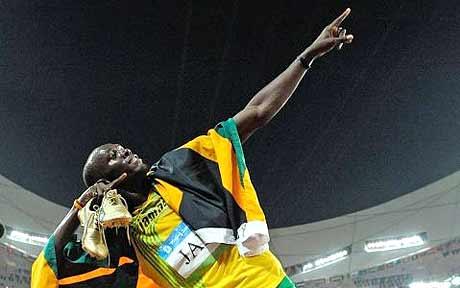 champion’s champ: funny, playful, and seemingly carefree on the surface, he has turned into a consummate businessman, with multiple businesses and endorsements, most notably from Puma, to the tune of US $20 million. Bolt has certainly earned this contract: By simply taking off his gold Pumas and waving them around in Beijing, he sold the product out worldwide in one fell swoop. Bolt has evidently turned down lucrative offers to play football in the United States, electing to remain Jamaica-based, further endearing himself to the populace. Scenes of Jamaicans watching his 100-meter victory in the busy Halfway Tree intersection in Kingston, which came to a standstill each time Jamaican athletes raced, can be viewed on YouTube: http://www.youtube.com/watch?v=sG-6onahH6Y.
champion’s champ: funny, playful, and seemingly carefree on the surface, he has turned into a consummate businessman, with multiple businesses and endorsements, most notably from Puma, to the tune of US $20 million. Bolt has certainly earned this contract: By simply taking off his gold Pumas and waving them around in Beijing, he sold the product out worldwide in one fell swoop. Bolt has evidently turned down lucrative offers to play football in the United States, electing to remain Jamaica-based, further endearing himself to the populace. Scenes of Jamaicans watching his 100-meter victory in the busy Halfway Tree intersection in Kingston, which came to a standstill each time Jamaican athletes raced, can be viewed on YouTube: http://www.youtube.com/watch?v=sG-6onahH6Y.
I actually called Jamaica in the gold (Usain Bolt) silver (Yohan Blake) and bronze (Warren Weir) positions for the 200 meters before the race began. NBC commentator, Trinidadian 4-time Olympic medalist Ato Bolden, move over! Weir, who watched the 2008 Olympics from his couch, was told by Coach Glen Mills, who also coaches Bolt and Blake at the Racers track club http://racerstrackclub.com/athletes/, that he could become a world-class sprinter. I celebrated this triple feat with my parents, each of us decked out in our Jamaica 50th independence wear, courtesy of my cousin Helen, as we watched Usain make history as the first athlete to take the 100 and 200 meters in two consecutive Olympics.
Although it is more customary to close track and field with the 4 by 400, because of Bolt’s appeal (he’s now the most talked-about athlete on Facebook), the 4 by 100 is now the closing event. After the Jamaicans won the 4 by 100-meter race in 36.84, world record time, Bolt said modestly, “This is what I came here [to the London Olympics] for, to be a legend.”
That he is. Bolt has enlivened a nation and the Jamaican diasporic community, and reinvigorated worldwide interest in track and field.
Shelly-Ann Fraser-Pryce (4-time Olympic medalist, including 100-meter gold in 2008 and 2012), like Bolt burst onto the international stage at the Beijing Olympics, with an exuberant smile punctuated with braces—evidence of her newfound good fortune.
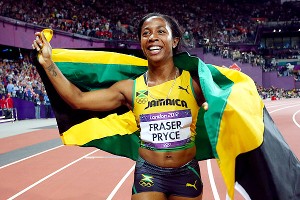 As Fraser-Pryce told NBC recently, she was raised in a ghetto in Kingston. She related the story of being told by an adult male at the tender age of 12 that it was time for her to be “plucked.” Her mother responded to the slug by brandishing her machete! Fraser-Pryce is now a student at the University of Technology in Jamaica, where she is studying child development. She is the first person in her family to go to college, the first UNICEF National Goodwill Ambassador for Jamaica and the first Jamaican woman to win Olympic gold in the 100 meters. Fraser-Pryce’s story is what makes sports worthwhile in my book.
As Fraser-Pryce told NBC recently, she was raised in a ghetto in Kingston. She related the story of being told by an adult male at the tender age of 12 that it was time for her to be “plucked.” Her mother responded to the slug by brandishing her machete! Fraser-Pryce is now a student at the University of Technology in Jamaica, where she is studying child development. She is the first person in her family to go to college, the first UNICEF National Goodwill Ambassador for Jamaica and the first Jamaican woman to win Olympic gold in the 100 meters. Fraser-Pryce’s story is what makes sports worthwhile in my book.
Up and coming Yohan Blake, who has beaten Usain Bolt a couple of times, most notably at the Jamaican Olympic trials, and is his training partner, is certainly one to watch. If Usain Bolt is thinking of retiring after the Brazil games, he is the heir apparent. Stay tuned!
A Cultural Legacy of Sports
Sprinting is just as much a part of the Jamaican culture as long distance running is to the Kenyans and the North Africans. During my parents’ generation, in the absenc of a reliable public-transport system children walked—and ran—everywhere, a practice that still exists to a lesser degree, particularly in the countryside. In her childhood my Aunt Cynthia served as a messenger and runner for my great granduncle, who owned a store in the country. Now in her 80s she is a decorated tennis player who travels the United States playing in the senior leagues. Schools also encouraged sports such as track and field, hockey and netball under the colonial system. Children—both boys and girls—played cricket. One of my most ladlylike senior cousins, Faye, was a killer cricket player in her youth. I am told that upon entering the field and noting her presence, boys would simply drop their bats and go home, as if to say “Why bother?” Faye, who grew up in Kingston, also once described a school sytem in which students were divided by “houses,” with points for academics, religious studies, and you guessed it—sports. She is a former prefect of one of these houses. The success of the Jamaican team needs to be viewed by outsiders in context. No good story starts in the middle.
And speaking of good stories, many thanks to handsome, square-jawed NBC anchor Lester Holt, who used his influence to achieve the best Olympics coverage of Caribbean  athletes I have ever seen in recent memory. Lester, who is of Jamaican descent, did interviews with Bolt, Fraser-Pryce and Blake on the island, in their track clubs and at their favorite haunts. Holt documented the track clubs, which are churning out the world’s fastest athletes, as well as the prestigious, 4-day multi-sport high-school competition, Champs, which I liken to the Penn Relays here in the United States. Jamaicans are fanatical about this competition, which seems to further highlights the pride they have in their almae matres. See http://www.golocaljamaica.com/champs/ for more information. And for the first time ever, I saw Bolt’s gold-medal ceremony, with the lilting anthem, “Jamaica, Land We Love,” which fittingly played—in England— one day before Jamaica’s 50th anniversary of independence from England. As the saying goes, “You’ve Got a Mouth: Use It! Thanks Lester Holt!
athletes I have ever seen in recent memory. Lester, who is of Jamaican descent, did interviews with Bolt, Fraser-Pryce and Blake on the island, in their track clubs and at their favorite haunts. Holt documented the track clubs, which are churning out the world’s fastest athletes, as well as the prestigious, 4-day multi-sport high-school competition, Champs, which I liken to the Penn Relays here in the United States. Jamaicans are fanatical about this competition, which seems to further highlights the pride they have in their almae matres. See http://www.golocaljamaica.com/champs/ for more information. And for the first time ever, I saw Bolt’s gold-medal ceremony, with the lilting anthem, “Jamaica, Land We Love,” which fittingly played—in England— one day before Jamaica’s 50th anniversary of independence from England. As the saying goes, “You’ve Got a Mouth: Use It! Thanks Lester Holt!
Jamerican Gold
Congrats to 400-meter and 4 by 400-meter gold medalist Sanya Richards-Ross, who was born in Jamaica, and as a budding young athlete brought to the United States by her parents. It seemed that her entire clan including her husband, NFL defensive back Aaron Ross, was in London to watch her race. While I agree with her statement that athletes should receive some formal compensation with all the billions being made in Olympic dollars (and the financially cynical move to allow professional athletes to play on the basketball teams), I don’t agree with her timing . . . but it’s all about free speech Affirming Community; it comes with the package.
Jambrit Gold
Jessica Ennis, “Our Jess” as the Brits call her, won the heptathlon, after handily dealing with the pressure of being seen as the “face of the games.” Jess’s late father hailed from Jamaica. 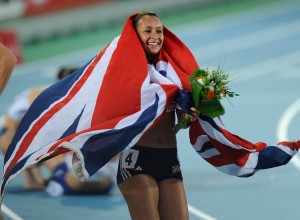
Kudos to Jess for winning the gold in her home country, Great Britain, which put on a jolly good show, complete with great opening and closing cermonies, and avid participation by the royal family, who seemed to treat attendance at the events as a full-time job.
A Sportsman and a Gentleman: Spice is Nice!
Kirani James has touched the hearts of the global audience, and by being the first Grenadian to win an Olympic medal, is emblazoned forever in the hearts of his countrymen. Kirani swept the 400-meter final, earning gold. Congrats to this young man and the spice island! This self-possessed teen, in an act of supreme sportsmanship, swapped nametags with the valiant 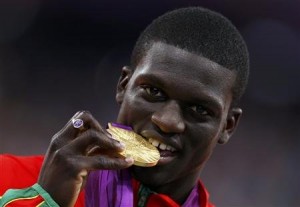 Oscar Pistorious, the first double-amputee to run in the Olympics. Oscar’s feat puts able-bodied people to shame, and he’ll run in the Paralympic games, set to begin just two weeks after the Olympics ends.
Oscar Pistorious, the first double-amputee to run in the Olympics. Oscar’s feat puts able-bodied people to shame, and he’ll run in the Paralympic games, set to begin just two weeks after the Olympics ends.
Other Feats of Bravery and Resolve
Hats off to the amazing feat of American Manteo Mitchell, who ran with a broken fibula in the 4 by 400 relay. Shades of revered Japanese gymnast Shun Fujimoto landing on his broken kneecap after the rings exercise, helping his nation take the team gold in the 1976 Montreal Montreal Olympics. Mitchell is not to be upstaged by American silver medalist Bryshon Nellum, who ran the 4 by 400-meter race three years after being shot in both legs. (Yes, Affirming Community, I will stop complaining about my bad knees—at least until the end of the month!)
Running for Grandma
Perhaps the most touching medal ceremony ever was that for Felix Sanchez of Dominican Republic, who won gold in the 400-meter hurdles. After the race, he collapsed to the ground and took out and kissed a photo of his abuela (grandmother) and him, which he had pinned to his nametag.
His grandmother, he learned, passed away on the day he ran the same race at the Beijing Olympics. Devastated then, he wept all day and came in close to last, a far cry from his Olympic gold medal in 2004. Overcome again at the medal ceremony, where he prevailed for his abuela, Sanchez wept uncontrollably. Abuela would be proud.
The Fierce Five: Grace Under Pressure
Congrats to the Fierce Five: Gabby Douglas, McKayla Maroney, Aly Raisman, Kyla Ross, and Jordyn Weiber. They made us proud with their gold-medal team performance, and for their teamwork and sportsmanship throughout the competition, traits not seen enough among American athletes. 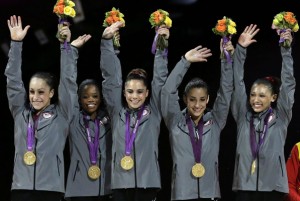
Gregarious Douglas, who at 16 has had minimal international experience, peaked at the right time to take the title of All-Round gymnast. “No guts no glory,” her coach, Liang Chow, always tells her. Chow, a former gymnast who competed for China and retired without an Olympic experience, says that does not live vicariously through his students, which includes 2008 gold medalist Shawn Johnson; this is their time, now. His fatherly approach to his charges seems a far cry from that of previous coaches, known for playing athletes off against one another and turning cold shoulders on their blunders.
What Sports Can Teach Us About Life
And speaking of coaches, Michael Phelps’ coach, Bob Bowman, told a journalist about doing things to mess with Michael’s head such as hiding his goggles at a meet or ordering the car service to come late so that he would not have time to eat before a competition. When Michael famously swam a gold-medal race with his goggles filled with water in Beijing, it was a testament to his coach’s training on coping—and thriving—in conditions that are less than optimal. It is, after all, how we adjust in times of strife—not how we coast when everything goes well—that separates the men from the boys and the women from the girls. I must congratulate Michael Phelps—the most decorated Olympian of all time—whose early losses in the London Olympics seemed to humanize him as much as his effervescent training partner, 4-time gold-medalist Missy Franklin, who’ll be another one to watch in 2016. Missy is weighing numerous, lucrative offers to go professional in favor of going to college and to swimming on the collegiate level in 2013, her original plan.
The Olympic story is not complete without David Boudia, the first American man to win a gold medal in diving (10 meter platform) since Greg Louganis in the 1988 Seoul Olympics. 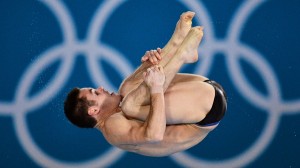
Boudia squeaked into the finals with spot 12 out of 12, to go on to the number-one berth over the formidable Chinese diver Qiu Bo.
Ode to A Towel
Affirming Community, I cannot close this posting without a shout-out to Danell Leyva’s towel, which has its own Twitter account with more than 10,000 followers, and to Danell Leyva himself, bronze medalist in the men’s all-around gymnastic competition. Leyva takes the towel that was a gift from his aunt to every meet, and in fact everywhere he goes. For those of you out there who are still secretly toting stuffed animals, blankets and articles of clothing from toddlerhood 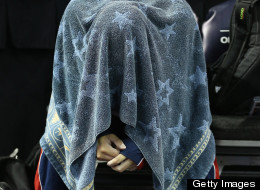 everywhere you go, I know this resonates—and I’m not naming any names! Leyva uses the towel to shield his eyes from the competition and the chaotic atmosphere at the meets, and to focus. He also passively allows his stepfather, his coach, to kiss him and tweak his ears before he takes to each apparatus, a bizarre routine that proves, once again, that family is everything.
everywhere you go, I know this resonates—and I’m not naming any names! Leyva uses the towel to shield his eyes from the competition and the chaotic atmosphere at the meets, and to focus. He also passively allows his stepfather, his coach, to kiss him and tweak his ears before he takes to each apparatus, a bizarre routine that proves, once again, that family is everything.
My next Olympics posting will actually be from Brazil in 2016, Affirming Community. Hold me to it; it will be the fulfillment of a lifetime dream. Ciao!
Imperatriz Careca (Baldhead Empress)

You must be logged in to post a comment.